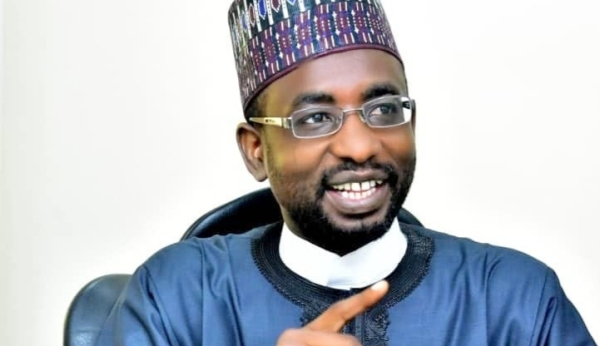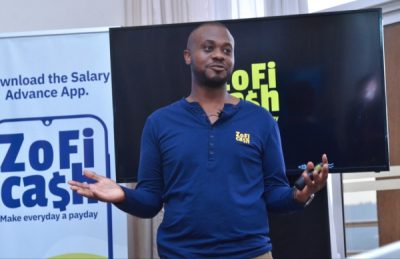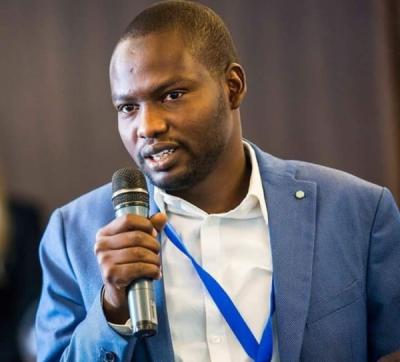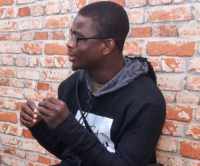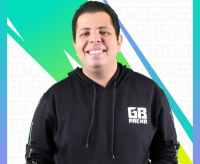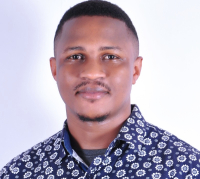
TECH STARS (1007)
He is an IT professional with extensive experience in growth management, policy formulation, IT operations, and digital transformation. Above all, he has earned the trust of the President of the Federal Republic of Nigeria.
Kashifu Inuwa (photo) is a Nigerian tech expert. The Abubakar Tafawa Balewa University graduate is the Director General of the National Information Technology Development Agency (NITDA).
He was reappointed to that position in February 2023, after a first 4-year term that started in 2019. The renewed confidence shown by President Muhammadu Buhari is the result of the successful actions he carried out during his first term.
During that term, Kashifu Inuwa successfully implemented various digital transformations, talent development, digital innovation, entrepreneurship and regulation development, and emerging technologies' exploration of indigenous IT content promotion programs, among others. When he joined the NITDA in 2017, he was the technical assistant to the then-director general. In that position, he was actively involved in the designing, planning, coordination, and execution of the agency's activities.
His professional career began in 2005 at Galaxy Information Technology & Telecommunication Ltd. where he was a network engineer and designed the Abuja wireless network that was serving over 50 clients. He also provided first and second-level support to over 1000 users.
In 2007, he joined Galaxy Backbone as an IP network field engineer before being promoted to senior network engineer (2009) and senior solution architect (2011). With his team, he designed more than 10 national IT systems that have helped promote the rollout of e-government platforms in Nigeria.
In 2014, he was hired by the Central Bank of Nigeria as a technology architect.
Melchior Koba
She is a passionate entrepreneur who wants to give back control over the entire food value chain to significantly reduce crop losses in Egypt. With her brother, she developed a tech solution for that purpose.
Farah Emara (photo) is the CEO of Egyptian agritech startup Freshsource, which she launched with her brother Omar Emara.
Her startup leverages data and tech tools to transform the lives of producers, businesses, and consumers by creating sustainable food systems. It was launched after its two co-founders realized that in Egypt, food security is jeopardized because close to 30% of crops are lost due to poor post-harvest, storage, and transportation conditions. They also noticed that the high number of intermediaries in the supply chain and the lack of transparency generate an about 80% income shortfall for farmers.
Therefore, with over 80 employees, the startup launched in Cairo, in 2018, manages the entire fresh food value chain, including transportation, storage, and packaging in cold storage and appropriate facilities. It buys from farmers at consistent prices and sells the products at reduced rates. Nowadays, it serves clients in 11 cities in Egypt, with the aim of becoming the leading agricultural supply chain platform in the Middle East and North Africa region and changing the way fresh produce is bought, transported, and sold. It has already transported more than 10,000 tons of produce and claims over 1,000 deliveries weekly.
"FreshSource is disrupting the Egyptian agriculture industry by streamlining the value chain through technology. We are the region’s first B2B platform for fresh fruits and vegetables, connecting producers to businesses by leveraging data and technology and providing last-mile solutions," Farah Emara said in 2022.
Before founding FreshSource, between 2012 and 2016, she worked for Endeavour, a global community of high-impact entrepreneurs, as an entrepreneur selection and growth analyst and then as an entrepreneur selection and growth manager. In March 2016, she joined the consumer goods company Procter & Gamble where she worked as a Strategic Business Manager for the Middle East until 2018.
Let's note that her startup is among the 14 businesses selected for the 2023 Africa Tech Summit (February 15-16). In 2022, she received the Digital Agriculture Award of the year, issued by the World Bank and the IFC.
Melchior Koba
The tech enthusiast is a computer system and network administrator who graduated from ABCO Technology, an accredited Californian computer training academy. After years of experience in the U.S Tech environment, he decided to launch Zofi Cash, which provides instant salary advances to help Ugandans handle emergency needs.
Paul Kirungi (photo) is a Ugandan tech entrepreneur and the founder/CEO of Zofi Cash, a fintech startup that provides instant salary advances to employees.
The entrepreneur, based in the U.S. since 2012, founded Zofi Cash in 2020 to break the 30-day pay cycle in Africa. His solution allows employees to address their financial emergencies before payday with very low-interest rates without any collateral other than employers' approval.
"Zofi Cash is a financial services company focused on breaking the 30-day pay cycle. We seek to change the way employees or contractors get paid in this country and across Africa. That is why our salary advance service is now a market leader, and we haven’t stopped innovating. Our teams are intentional about the continuous improvement of the platform to allow more people to get paid daily," he said in an interview with entrepreneur ecosystem builder Innovation Village Uganda.
On January 31, 2023, Zofi Cash was selected, along with 13 others, to participate in the 2023 Africa Tech Summit (Feb 15-16) at the Sarit Expo Centre in Nairobi, Kenya.
Paul is an alumnus and ambassador of the Startup Africa Roadtrip, a non-profit organization supporting innovation in developing countries.
He entered the professional world in 2016, working as a systems support at Providence Hospital, in California. Months later, he joined Barkley Court Reporters as a system administrator. Thanks to Zofi Cash, he received the Next Generation Africa 2021 Best Fintech issued by Startup Africa Roadtrip.
Melchior Koba
The talented and passionate entrepreneur leverages his IT expertise to support local entrepreneurs and help them succeed.
Abdelsalam Safi (photo) is a Chadian social and tech entrepreneur. He is one of the co-founders and CEO of WenakLabs, the first startup incubator in Chad.
His incubator, founded in 2014, claims to be both a media lab and a tech hub that aims to help bridge the digital divide and promote tech entrepreneurship by all means. It also defines itself as a "space of collective intelligence and social innovation" that "defend a horizontal and transparent way of working."
Last January 18, it inaugurated its media lab, which is equipped with all the professional tools that can facilitate audiovisual and digital works and get training in related professions. Some of its equipment enables photo and video shooting, graphic designing, and the production of web TV shows.
" Our media lab is an interdisciplinary research lab where researchers, artists, designers, etc. can work together to leverage ICT potentials to solve problems and identify new opportunities", explained Abdelsalam Safi.
Since February 2020, the tech entrepreneur is the country director of the Chadian chapter of the American business incubator Founder Institute. Since 2006, he is also a member of the nonprofit organization Free Software Foundation.
His professional career began in 2012 when he started teaching system and network administration at the Chadian private school IPNT (Institut Polytechnique de nouvelles technologies). About a year later, he also started teaching Java object-oriented programming at the University Institute of Sciences and Technology of Abeche.
Melchior Koba
The talented entrepreneur combined tech tools and his experience in the event industry to offer an innovative solution to help event specialists in their work.
Haythem Dridi (photo) is the founder of the tech company Millesima Technologies. The Tunisian-born entrepreneur is a Mathematics and Physics graduate from the Faculty of Science of the University of Sfax, Tunisia. He is also a certified project manager.
Millesima Technologies, the startup he manages as the CEO, is a Startupact-certified Tunisian company. It specializes in data and on-demand video streaming. The startup launched in 2021 also offers face-to-face, hybrid and virtual solutions to event specialists.
In late 2022, it raised US$480,000 from private equity firm BH Equity to launch MYVIOO, a digital platform that allows firms and organizations to launch free or paid on-demand video and live-streaming channels that can be used as advertising spaces.
Haythem Dridi's entrepreneurial adventure began with the creation of Millesima Travel and Millesima Events in 2004. Millesima Travel is a licensed Tunisian travel agency specializing in B2B hotel booking and business travel management.
Meanwhile, Millesima Events is an events agency based in Morocco and Tunisia. The agency has already worked with 794 clients and organized 2,596 national, 60 overseas, and 150 virtual and hybrid events.
It is somehow the originator of Millesima Technologies, which was launched to allow it to continue its operations when the coronavirus pandemic forced a cessation of face-to-face events.
Melchior Koba
With Moja Ride, he successfully transformed mobility in Côte d'Ivoire, where public transportation is poorly organized.
Jean Claude Gouesse (photo) is an Ivorian entrepreneur and the co-founder/CEO of Moja Ride, a mobility aggregator based in Côte d'Ivoire.
His mobility startup, founded in 2017, connects informal transportation modes on a single platform. It also provides a ticketing platform that allows transport operators, and cab and minibus drivers to track their earnings and offer unsecured car loans all thanks to the Moja Wallet that enables drivers to save and borrow funds and pay for expenses.
The startup has launched a contactless card and QR code payment technology to make it easier for users to pay for their rides. The said users can also buy their tickets online.
Before Moja Ride, in 2016, Jean Claude Gouesse co-founded Bouttic Technologies, which offers business management solutions. Three years earlier, he also co-founded fintech company R.A.T.E.S MONETIC, the brain behind the solution eCash Express, which aims to 'redefine the mobile money revolution through easy-to-use and affordable payment solutions."
Between 2014 and 2015, in Seattle, USA, he participated in Techstars' Startup Weekend, "a three-day program where aspiring entrepreneurs can experience startup life."
Let's note that Moja Ride is among the eleven startups selected to participate in the third cohort of the Africa Startup Initiative Program (ASIP), an acceleration program organized by Startupbootcamp Africa and Telecel Group.
Melchior Koba
He is a staunch believer in new technologies' capacity to positively change the healthcare industry in Africa. His startup develops powerful algorithms to fill the radiology gap on the continent.
Mustapha Zaidan (photo) is a Ghanaian entrepreneur and the co-founder/CEO of Chestify AI Labs, a startup that aims to revolutionize the African healthcare industry.
His startup, founded in 2020, develops artificial intelligence solutions to solve the most critical health problems in Africa. For instance, it launched radiology algorithms that can increase throughput by automating the analysis and reporting of routine chest X-rays, which are still time-consuming with significant backlogs.
One of the algorithms developed by the start-up is “blue dot”. The latter, which was developed from more than 112,114 images, analyzes and highlights anomalies in images with impressive speed and accuracy.
In 2017, Mustapha launched Obaatanpa (meaning great mother in the Ghanaian dialect Akan), a mobile app developed to reduce the mortality rate. The digital solution gives pregnant and breastfeeding women real-time information about what happens to them during pregnancy and breastfeeding. It also has a menstrual tracker that allows women to know their fertile windows.
In 2019, he also founded FastRx, a healthtech startup that facilitates access to quality medicines.
From October 2015 to August 2021, he Was a software engineer at Kumasi Hive, an incubator and innovation hub "which provides a platform for rapid prototyping of ideas, supporting local Innovations and promoting entrepreneurship."
Let’s note that his startup, Chestify AI Labs, has been selected to take part in the third cohort of the Africa Startup Initiative Program (ASIP) acceleration program.
Melchior Koba
The tech entrepreneur has an extensive experience in the African tech industry with renowned software development skills.
Cossi Achille Arouko (photo) is a Beninese entrepreneur and computer scientist. He is the founder and CEO of fintech startup Bujeti, which enables African emigrants to plan, organize and track the funds they send to their relatives back home.
Though initially dedicated to emigrants only, the fintech startup (founded in 2021) was later expanded to cater to even Africans living on the continent because Cossi noticed that the diaspora was not the only group affected by the management problems he was addressing. Most African businesses were affected too.
"At the heart of Bujeti is the desire to bring transparency to financial transactions, to promote accountability, and enable control. [...] We wanted the Black Tax to be less of a burden on the diaspora, and then realized that we would have even more impact by offering this solution directly to African businesses. We decided to pivot to a full-fledged B2B budgeting and expense management for the African market," he said back in 2022.
His startup, Bujeti, is among the 94 companies that will participate in the Winter 2023 cohort of startup accelerator Y Combinator. The selection entitles the fintech startup to US$500,000 support and more exposure to international investors.
In 2018, the tech entrepreneur co-founded OyaPay, a fintech startup he served as the chief technology officer till 2019. He also co-founded Skylar Labs that enables helps SMEs build their cross-platform chatbots to engage clients.
He entered the professional world as a software development intern at Bénin Télécoms SA, in 2011 and 2012. He also did a 7-month internship at AREVA NP, in 2014, where he worked in the development team of a mechanical calculation and piping software. In 2016, he completed an engineering internship in the research and development department of the digital studio Oyez in Paris.
From December 2017 to July 2018, he was a full-stack developer at the artificial intelligence startup Smartly. AI. In 2019, he joined the Nigerian fintech company Paystack as a senior software engineer before becoming the tech lead in 2020.
Melchior Koba
The entrepreneur has a great passion for e-sports. With GBarena, he is pursuing his goal of creating a comprehensive gaming and e-sports hub that connects gamers from around the world through daily tournaments, events, and activities.
Samer Wagdy (photo) is an Egyptian entrepreneur and gamer. He is also the founder and CEO of the online gaming platform and community GBarena.
GBarena, founded in 2015, connects gamers through global tournaments and challenges, providing tournament organizers with a tool to help them create and manage their tournaments from start to finish. It also helps businesses reach their target audience through gaming.
A few days ago, the start-up acquired the Tunisian e-sports and gaming start-up Galactech which had 200,000 active users. With that acquisition, GBarena continued its MENA expansion by leveraging its new acquisition's presence and capabilities in Riyadh, Dubai, and Tunis.
"Our goal has always been to provide our users with an unparalleled esports experience, no matter where they’re located in the world. With our acquisition of Galactech, we can now ensure that our users from North Africa will have access to identical features and content they have come to expect from us while providing them with extensive opportunities for growth and development within the esports community," said Samer Wagdy.
In 2014, the latter co-founded an IT firm Rackisland and developed a mobile app GEEXPAD (in 2013), which allows users to play PC games using their smartphone as a game controller and joystick. About three years earlier, he founded the IT agency Double Bridge.
Thanks to GBarena, Samer Wagdy was admitted to the French government incubation program at La Belle de Mai in 2017. In 2015, he was selected to be one of the finalists in the University Startup World Cup competition in Copenhagen, Denmark. With Rackisland, he won the Orange Social Venture Prize in 2014.
Melchior Koba
The award-winning entrepreneur is a tech enthusiast and civic activist. He is committed to education and financial inclusion, notably in rural areas that are usually hard to reach.
Charles Muhindo (photo) is a Ugandan computer scientist and the co-founder/CEO of fintech startup MamboPay.
His startup, founded in 2016, helps businesses and individuals make payments through state-of-the-art NFC cards designed to provide a Tap-andPay experience to recipients and enable real-time fund transfers to or from mobile money wallets. The startup addresses three major challenges in the everyday use of digital financial transactions. They are notably transparency, accountability and personal finance management.
In 2013, Charles Muhindo also co-founded BrainShare Ltd, an edtech startup that gives learners access to top-notch education content online and offline. It creates an inclusive learning environment by supporting the creation of content by local teachers for African learners. He served the edtech startup as CEO up to 2021.
Charles Muhindo's professional career began in 2011 at IntelWorld where he was a senior application developer. As such, he was "responsible for mobile applications with core emphasis on USSD, SMS, mobile and web applications." He developed a range of enterprise, e-commerce, and sports betting applications.
In 2012, he joined Orange Uganda where he worked on developing new applications to ensure better service delivery to customers.
In 2012, he won the bronze medal during the Orange Community Innovation Awards. The following year, he was among the top 40 African entrepreneurs selected by the US State Department's Global Innovation for Science and Technology (GIST). The same year, BrainShare was featured on CNN's list of the top 10 African startups.
He has been invited to speak at events organized by international institutions including the Finnish Ministry of Education and Culture and the United Nations Conference on Trade and Development.
Melchior Koba
More...
The tech entrepreneur is passionate about robotics innovation. His startup, Nureab, is the first MENA company to go into rehabilitation robotics.
Bahy Elnesr (photo) is an Egyptian tech entrepreneur and the co-founder/CEO of Nureab, a startup that manufactures rehabilitation robots for the Middle East and African market.
The startup, launched in 2020, leverages new technologies to help people with motor disabilities improve their living conditions and quickly recover. The motor rehabilitation devices the startup manufactures optimize patients' recovery process with little pain and maximum movement functions that produce positive results.
Apart from Nureab, Bahy Elnesr is also the co-founder and CTO (till 2021) of The Flankers, an Egyptian startup and innovation center specializing in the robotics, artificial intelligence, and aerospace industries. Since 2015, The Flankers has launched over six products and developed 63 projects with more than 30 national and international partners. It is the first Egyptian company to develop a nanosatellite using tech tools like artificial intelligence.
Before his entrepreneurial career, he had traineeship experience with several international firms. For instance, in 2016, he was a trainee with German Auto Service Egypt, for two months. In 2017, he did a 1-month traineeship at oil and gas firm Bapetco and another month at EgyptAir. He worked at Belayiem Petroleum Company for two months and did another 1-month traineeship at Amal Petroleum Company.
In 2018, after another stint at Bapetco and Belayiem Petroleum Company, he also completed an internship at the Italian energy company Eni.
Melchior Koba
The tech entrepreneur wants to improve education using tech tools. Thanks to his startup AltSchool Africa, he helps develop tech talents in Nigeria and in Africa as a whole.
Adewale Yusuf (photo) is a Nigerian tech entrepreneur and the founder/CEO of edtech startup AltSchool Africa.
The startup, launched in 2021, is open to anyone willing to acquire tech skills and start a professional career in the tech industry. It is based in Kigali, Rwanda. It adopts a modern approach to training by delivering courses directly related to the learner's chosen field of study with a curriculum that combines theory with hands-on practice to turn anyone into a top software engineer within a year.
According to Adewale, some startups are willing to take AltSchool Africa graduates as interns. "We’ve signed up some of the best startups on the market, and that’s one of the most exciting things about what we’re doing," he said in January 2022 when his startup raised US$1 million in pre-seed funding.
He got the idea to launch AltSchool Africa when he was managingTalentQL, a start-up he founded in 2020 to hire, develop and manage talent remotely for global companies. At the time, he realized that there was a big gap in the foundational knowledge of some of the software engineers who were going through his company's vetting process. So AltSchool was launched to solve that problem.
The serial tech entrepreneur is the co-founder and former publisher of Techpoint Africa, a media platform dedicated to startups and innovation in Africa.
He is also a Techstars Mentor and board advisor for Life Beyond Disability Foundation, a nonprofit organization that advocates for the rights and empowerment of people living with disabilities in Africa. In 2016, he founded Techpremier Media, the publisher of Techpoint Africa. Three years earlier, he had launched OnedotPhoto.com, a photography company he served as the lead photographer till 2017.
The entrepreneur also worked for the IT services company Danami Nigeria as a quality assurance & UX tester between 2011 and 2012. From 2012 to 2014, he was a blogger for OTEKBITS.com.
Melchior Koba
After his studies, he worked in senior positions at large financial institutions. He joins Mastercard with some 22 years of professional experience to support the payment and tech company's development in Africa.
Jean-Charles Yallet (photo) is a finance expert and a graduate of the University of Cocody where he obtained a master's degree in finance in 1997. He also holds a master's in finance and business strategy (2004) from Oxford Brookes University. He was recently appointed "Country Lead for Mastercard Sub-Saharan Francophone Africa (FSSA) operations across the Middle East and North Africa (MENA) West cluster."
His appointment (effective since September 2022 according to his Linkedin profile) was announced on January 17, 2023. In that role, he will oversee the development of Mastercard's services and innovation across 17 countries. He will also help advance digital and financial inclusion.
"I am thrilled to join Mastercard at this exciting time as we continue to innovate and use the reach of our network to digitize the payments sphere, bringing more people into the financial ecosystem. I am determined to capitalize on the great work we have already done as part of our ongoing commitment to making transactions simpler, safer, and smoother across the region," he said according to a French release.
The new position enriches his over 22 years of experience in the banking and finance industry. Indeed, between 2009 and 2012, he served as senior relationship manager and country head of wholesale banking with the banking group UBA. Later, for ten years, he assumed various positions at Standard Chartered Bank where he started as director of transaction banking in 2012.
Melchior Koba
He fights global warming by improving waste management. His startup exchanges waste for basic products to encourage users from whom the waste is collected.
Alaa Afifi (photo) is an Egyptian entrepreneur and the co-founder/CEO of Bekia, a waste management startup.
The startup, founded in 2017, leverages technology to find solutions to issues related to climate change and pollution. It for instance set up an exchange system that allows customers to trade recyclable waste for groceries, subway tickets, medicine, or other household items. Also, it repairs and resells discarded electronics if they are still reusable.
"We in Egypt don’t have startups that can invest in waste and its management. We only have people who can collect the waste from the streets. We need a solution to the problem. So we thought of using the waste management problem as an opportunity because we have a lot of ‘valuable’ waste in our homes that simply end up on the streets," Alaa Afifi said in 2021 when asked what prompted the creation of Belkia.
In January 2023, the startup was announced in the inaugural cohort of the new US$2 million fund launched by VC fund Catalyst Fund. It will thus receive US$100,000 in equity investments and US$100,000 in hands-on business development support.
Its CEO entered the professional world in 2015 when he joined the online marketing team of eMarketing Egypt. Concurrently, he was a community manager for the local subsidiary review site Jeeran. From 2015 to 2008, he also worked as a project manager for the online shopping company herzon.com. The Google Adwords specialist is, since April 2019, a member of The Global Shapers Community.
Melchior Koba


